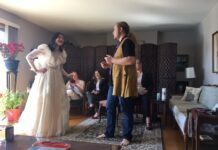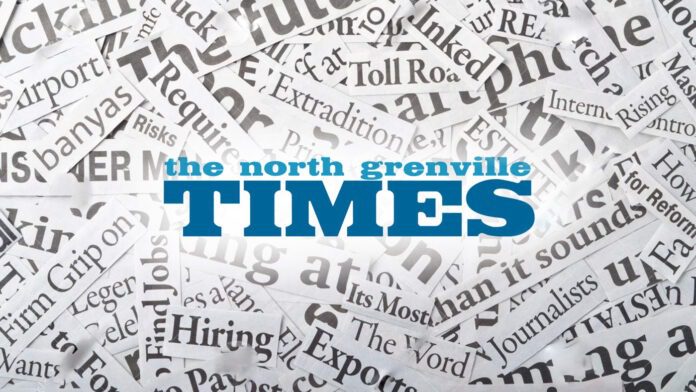Dear Editor,
I wish to respond to the letter you published from James Balkwill.
I write as a Non-Indigenous mother and grandmother of an Inuit family, with three First Nations sons in law. I have spent a life-time learning the gifts and the wisdom held out to us by the First Peoples of this land, and still know so little, compared to the richness of knowledge and experience that the First Nations, Inuit and Metis peoples possess and have offered to each of us whose families have immigrated here over the last two hundred years.
Unfortunately, I also know first hand what it is like to live through (some of) the intergenerational trauma waves – no, Tsunami Waves – that First Nations, Inuit and Metis individuals, families and communities are dealing with, as a result of the Government of Canada not living up to their side of the Treaties.
Believe me, there are still so many other stories of atrocities experienced at the hand of agents of government policies to ‘beat the native out of the natives’ over the last 150 years, that are not yet spoken.
As a country we still have much truth to uncover, to accommodate and to ‘make right’.
As a Treaty Canadian himself, (by virtue of the fact that our Government representatives sign on behalf of all “Canadian” citizens), Mr. Balkwill needs to know that, no matter how much he may like to minimize the ‘inconvenient’ truths that are presently coming to light in our country regarding the mistreatment of our Indigenous peoples, they will not go away.
He and all Canadians would do well to get beyond the ‘not knowing that he doesn’t know’ and diligently research the truths of our Canadian history.
Unfortunately, our educational systems, and even “libraries” (whether hard copy or digital), particularly in the past, have not adequately made these truths available to us, due to a backlog of decades of not hearing – or is that silencing?- First Nations, Inuit and Metis voices.
So it is now up to each of us, as individuals, families, communities, and places of work, not to mention government ‘agencies’, to actively seek to understand these truths – and gifts – now, each in the context of our own lives.
For starters, I would like to point James and other people who do not yet know what are the realities of our history, to some of the speeches of Chief Cadmus Delorme from Cowessess First Nation, who acknowledges that as Non-Indigenous Canadians we, too, need healing through these times.
I think if they honestly listen to some of Chief Delorme’s speeches, they may find a new ‘friend’, and perhaps find many new friends amongst the First Nations, Inuit and Metis peoples who are the ones who really know this land we call ‘our’ country.
Qujannamik.
Beverly Illauq
Dear Editor,
She:kon tanon skennen (greetings and peace).
I must respond to James Balkwill’s letter to the editor published last week as I cannot let stand the information and opinions he presents as fact.
Much of what I present here is taken from a presentation to members of the Aboriginal Justice Learning Network given in 1997 by then-Associate Chief Judge Murray Sinclair (later Chair of the Truth and Reconciliation Commission, and then a member of the Canadian Senate) but there are countless other factual sources to draw from.
Every good parent wants the best of opportunities for their children, but for generations this was decidedly not the view of the Government of Canada for Indigenous peoples.
One hundred and fifty years of federal policies and practices are now understood as a cultural and social genocide through the eradication of Indigenous cultures, languages, and a callous lack of concern for the lives and welfare of the thousands of Indigenous school children we now read about in weekly headlines.
First Nations weren’t slow to understand the advantages for their children of a western education, and the numbered treaties signed with the Crown that mention education do so through the single line “At such time as the Indians shall desire, a school shall be provided for them”.
Mr. Balkwill’s statement that “Much of the Native Leadership agreed to the residential school process” and that 75% of all chiefs wanted the residential school process and signed agreements to that effect is ludicrous.
Common sense tells us that 150 years of residential and day schools with all their physical/emotional/sexual abuse, sickness and death were most definitely not what chiefs, parent or communities had in mind when the treaties were signed.
Mr. Balkwill comments that for about 140 years, generations of Native leadership were able to speak with and protest to government officials to have their concerns addressed and states: “they basically did nothing to protect these children” and concludes that the Natives’ own leadership failed them.
In his 1997 presentation, Justice Sinclair explains that laws were enacted to allow children as young as five to be forcibly taken from their families by police or government agents (this is well documented) and relocated hundreds of kilometres in residential schools; to make it an offense for First Nations to protest against the schools; that the 1880 Indian conspiracy laws allowed any group of three or more Indians to be jailed for seeking a grievance against the government or for seeking to engage a lawyer on their behalf (rescinded only in 1980); and that First Nations on reserves were legally prevented from entering into contracts.
Of course caring and protective First Nations parents protested and tried to get their children out of these schools (this is documented).
In response, the government passed a law making it an offence for any Indian parent to interfere with the education of their child in the schools. In the 1880s the government implemented the Indian Pass System (which many believe was later adopted by South Africa’s apartheid regime) which allowed the arrest of any Indian person found off the reserve without a written pass from the local Indian Agent…which effectively prevented parents from leaving their communities to recover or even visit their children.
Legal recourse? Canada has no shortage of lawyers now, and didn’t then either…and you might wonder why Indigenous people didn’t challenge the government’s laws in court.
But as Justice Sinclair points out, the government also decreed that no Indian could go to court and sue the Government of Canada unless they first got the permission of the government. And when Friendship Societies were formed by non-Indigenous people who supported the Indian cause and who themselves were willing to go to court on behalf of Indians, the government passed a law preventing anyone from representing an Indian in court unless they, too, got the permission of the Government of Canada.
However, Mr. Balkwill seems unaware of any of these many legal restrictions placed on Indigenous peoples and parents, insisting instead that chiefs and parents could have done something but seemingly did nothing.
Mr. Balkwill offers his opinion that “However imperfect the residential school program was, it ultimately was the foundation for all Native education”. Frankly, this is no different from asserting that residential and day schools were all done for the Indigenous peoples’ own good and that no matter what atrocities were endured, the end justifies the means.
Or perhaps as former Aboriginal Affairs Minister John Duncan (Conservative) stated just ten years ago: “…the Indian residential school system was not an act of genocide, but a case of education policy gone wrong.”
Glenn Karonhiio Morrison,
band member of the Mohawks of Kahnawá:ke located near Montreal
Dear Editor,
I want to thank David Shanahan and Marguerite Boyer for making the North Grenville Heritage Booklet. I enjoyed reading all of it and it will go on my bookshelf as a “keeper” after I have put a plastic cover on it.
Thank you and all your team so much for doing all the work researching, writing, photographing and printing it. Not to mention distributing it for free!
I found it in the free “take a book–leave a book” library box on Bolton Rd and I was thrilled!
North Grenville is a great community for many reasons, and this is one of them.
Janet Stark
Dear Editor,
Imagine that you learn that your neighbour is planning to build a storage shed on her property.
She intends to put the building in a spot that blocks your view of her pond. You sit and watch the sunset over the pond on many summer evenings. You do some investigation and find that your neighbour has all the permits needed to proceed with her project.
How do you stop her?
You meet her across the fence and talk about her plans. You talk with her calmly as you explain how much you enjoy the view of her pond. You have a polite conversation with her to explore alternatives.
She offers to move the storage shed to another corner of her property.
Furthermore, she invites you to enter her property and sit on the bench at the shore of the pond if you want to enjoy the sunset closer to the water. You return home satisfied that you managed to influence your neighbour’s plans and have an offer to enjoy the pond even closer than from your home.
This analogy reflects precisely what I expect my elected officials to do for me with the Ontario Government’s decision to build a correctional facility in North Grenville, and reflects what our Council has done.
I want our Council to respond logically and rationally, and to negotiate any concessions possible in a situation that is outside of their control. Our Council has succeeded in getting an agreement to move the facility further back on the property, and an offer to the municipality for the use of existing buildings.
Protesting is only productive if you truly believe that you can affect a decision. The Ontario government made the decision to build on their provincial land and how the government made that decision is irrelevant.
I agree with our Council that the Ontario government is going to proceed with building the correctional facility whether residents of North Grenville support the facility or not.
Our Council – and particularly Mayor Peckford – have done a great job representing North Grenville.
They established a number of progressive committees to improve life in North Grenville. Our Council actively supported the ParticipAction challenge to draw us together.
We have come through a pandemic stronger and closer as a community than many others.
I am grateful for the leadership of our Council. I have read too many disparaging letters and opinion pieces in The North Grenville Times about our Council.
This letter is to support the great work that these women and men have done and continue to do for our community.
Wayne Reed






